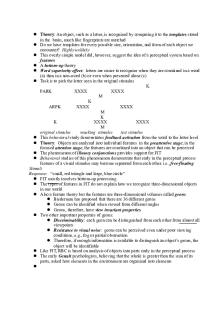Cognitive Psychology - Philosophical and Psychological Antecedents PDF

| Title | Cognitive Psychology - Philosophical and Psychological Antecedents |
|---|---|
| Course | Cognitive Psychology |
| Institution | University of the Cordilleras |
| Pages | 3 |
| File Size | 97.5 KB |
| File Type | |
| Total Downloads | 103 |
| Total Views | 135 |
Summary
Download Cognitive Psychology - Philosophical and Psychological Antecedents PDF
Description
Cognitive science is the interdisciplinary study of mind and intelligence, embracing philosophy, psychology, artificial intelligence, neuroscience, linguistics, and anthropology. Cognitive Psychology is the scientific study of mental processes such as "attention, language use, memory, perception, problem solving, creativity, and thinking". Coined by URIC NEISSER in 1967 (Cognitive Psych) INTELLIGENCE – Generally involves the capacity to learn from experience and ability to adopt to surrounding environment. METACOGNITION – Own learning, process your own thoughts. CULTURAL INTELLIGENCE - Western (Skill-based) vs. Eastern (Diplomas)
PHILOSOPHICAL ANTECEDENTS PLATO (428-348 BC) – Rationalism Reality resides not in the concrete objects we perceive but in the abstract form that these objecrs represent. Nativism - the notion that knowledge is innate, a property of mind. Idealism - the concept that the only world we can truly know exists only in the mind. ARISTOTLE (384-322 BC) Reality lies only in the concrete world of objects that our body sense. Empiricism - that all knowledge is derived from sense-experience, experience RENE DESCARTES (1596-1650) Reality directly or indirectly the significant issues related the foundations of science of the mind. Cogito Ergo Sum – I think therefore I am SOCRATES – who taught Plato and Aristotle IMMANUEL KANT - The Concept of Schema, a mediating representation -which is intellectual in one sense, sensible in another. BRITISH EMPIRICISTS John Locke (1632-1704) “tabula rasa” or BLANK SLATE Both sighted and blind ought to learn but the blind cannot acquire words like picture and see learning. Blank Slate - someone or something that is still in an original state and that has not yet been changed by people, experiences, etc.
PSYCHOLOGICAL ANTECEDENTS DONDER’S PIONEERING EXPERIMENT – Decision making test through Light bulb switch when clicked quickly. Reaction time. STRUCTURALISM - structure of the mind and its perception Proponents: Wilhelm Wundt – ANALYTIC INTROPSECTION is the examination of one's own conscious thoughts and feelings. In psychology, the process of introspection relies exclusively on observation of one's mental state. Edward Titchener – Wundt’s student, thoughts in experiments.
FUNCTIONALISM - mental states are identified by what they do rather than by what they are made of. Proponents: William James – Principles of Psychology John Dewey – thinking and schooling PRAGMATISM - usefulness, workability, and practicality.
THESIS + ANTI-THESIS = SYNTHESIS , Hegelian’s Dialectic German philosopher Georg Wilhelm Friedrich Hegel ASSOCIATIONISM – experience, learning Proponents: Hermann Ebbinghaus – rehearsal, memory retention (Theory Of Memory And Forgetting) / THE FORGETTING CURVE Edward Lee Thorndike – LAW OF EFFECT = responses that produce a satisfying effect in a particular situation become more likely to occur again in that situation, and responses that produce a discomforting effect become less likely to occur again in that situation.
BEHAVIORISM – observe overt behaviors Proponents: Ivan Pavlov – Classical Conditioning (Dog, Food and Bell) John Watson – LITTLE ALBERT (A white toy given with a scary, booming sound) B.F. Skinner – Operant Conditioning (reward and punishment) , Positive and Negative reinforcement
Rejection of radical behaviorism EDWARD TOLMAN – Cognitive Map, focuses on goal (rat and cheese experiment) ALBERT BANDURA – Social Learning Theory, mimics others (modelling)
GESTALT PSYCHOLOGY – the wholeness is more than the sums of its parts. Holistic Approach
RATIONALISM vs. EMPIRICISM Philosophy – Physiology Logical – Scientific Reason – Experiments Models of Intelligence 1. Three-Stratum Model of Intelligence (Caroll) 2. Theory of Multiple Intelligence (Gardner) 3. Triarchic Theory of Intelligence (Sternberg)
Research Methods in COGNITIVE PSYCHOLOGY
Laboratory, controlled experiments Psychobiological research (post-mortem studies) Self-reports (observe, gather data accumulated) Case studies (basis of involvement) Naturalistic observation (no intervention) Computer simulations and artificial intelligence
VOCABULARY Innate – existing Empiricism – basing ideas and theories on testing & experience Rationalism – reliance on knowledge Physiology – study of human body and its function Philosophy – knowledge and existence, wisdom Mind – think, thoughts...
Similar Free PDFs

COGNITIVE PSYCHOLOGY
- 591 Pages

SP605 Cognitive Psychology
- 70 Pages

Cognitive Psychology Paper 3
- 5 Pages

Cognitive psychology notes
- 26 Pages

Cognitive psychology 3
- 3 Pages

Cognitive Psychology Unit-1
- 14 Pages

Cognitive Psychology Class 2
- 8 Pages

Cognitive Psychology Notes
- 34 Pages

Domains OF Cognitive Psychology
- 4 Pages

Psych 414 Cognitive Psychology
- 9 Pages

SELECTED TOPICS IN COGNITIVE PSYCHOLOGY
- 125 Pages
Popular Institutions
- Tinajero National High School - Annex
- Politeknik Caltex Riau
- Yokohama City University
- SGT University
- University of Al-Qadisiyah
- Divine Word College of Vigan
- Techniek College Rotterdam
- Universidade de Santiago
- Universiti Teknologi MARA Cawangan Johor Kampus Pasir Gudang
- Poltekkes Kemenkes Yogyakarta
- Baguio City National High School
- Colegio san marcos
- preparatoria uno
- Centro de Bachillerato Tecnológico Industrial y de Servicios No. 107
- Dalian Maritime University
- Quang Trung Secondary School
- Colegio Tecnológico en Informática
- Corporación Regional de Educación Superior
- Grupo CEDVA
- Dar Al Uloom University
- Centro de Estudios Preuniversitarios de la Universidad Nacional de Ingeniería
- 上智大学
- Aakash International School, Nuna Majara
- San Felipe Neri Catholic School
- Kang Chiao International School - New Taipei City
- Misamis Occidental National High School
- Institución Educativa Escuela Normal Juan Ladrilleros
- Kolehiyo ng Pantukan
- Batanes State College
- Instituto Continental
- Sekolah Menengah Kejuruan Kesehatan Kaltara (Tarakan)
- Colegio de La Inmaculada Concepcion - Cebu




